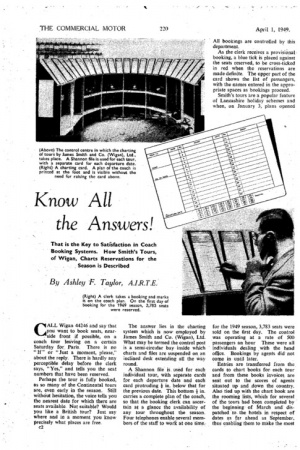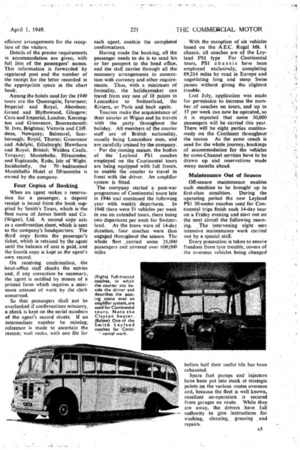Know All the Answers!
Page 10

Page 11

If you've noticed an error in this article please click here to report it so we can fix it.
That is the Key to Satisfaction in Coach Booking Systems. How Smith's Tours, of Wigan, Charts Reservations for the , Season is Described
By Ashley F. Taylor, A.I.R.T.E.
CALL Wigan 44246 and say that you want to book seats, nearside front if possible, on a coach tour leaving on a certain Saturday for. Paris. There is no " If " or "Just a moment, please," about the reply. There is hardly any perceptible delay before the clerk says, "Yes," and tells you the seat numbers that have been reserved.
Perhaps the tour is fully booked, as so many of the Continental tours are, even early in the season. Still without hesitation, the voice tells you the nearest date for which there are seats available. Not suitable? Would you like a British tour? Just say where and in a moment you know precisely what places are free.
c-2
The answer lies in the charting system which is now employed by James Smith and Co. (Wigan), Ltd. What may be termed the control post is a semi-circular bay inside which charts and files are suspended on an inclined desk extending all the way round.
A Shannon file is used for each individual tour, with separate cards for each departure date and each card protruding in. below that for the previous date. This bottom in. carries a complete plan of the coach, so that the booking clerk can ascertain at a glance the availability of any tour throughout the season. Four telephones enable several members of the staff to work at one time. for the 1949 season, 3,783 seats were sold on the first day. The control was operating at a rate of 500 passengers an hour These were all individuals dealing , with the head office. Bookings by agents did not come in until later.
• Entries are transferred from the cards to chart books for each tour and from these books invoices are sent out to the scores of agents situated up and clown the country. Also tied up with the chart book are the rooming lists, which for several of the tours had been completed by the beginning of March and dispatched to the hotels in respect of dates as far ahead as September, thus enabling them to make the most efficient arrangements for the reception of the visitors.
Details of the precise requirements in accommodation are given, with full„ lists of the passengers' names. This information is forwarded " by registered post and the number of the receipt for the letter recorded in the appropriate space in the chart book.
Among the hotels used for the 1949 tours are the Queensgate, Inverness; Imperial and Royal, Aberdeen; .Grand and Mythswood, Glasgow; Cora and Imperial, London; Kensington and Grosvenor, Bournemouth; St. Ives, Brighton; Victoria and Cliffdene, Newquay; Balmoral, Scarborough; Royal, Thurso; Grosvenor and Adelphi, Edinburgh; Hawthorn and Royal, Bristol; Waldon Castle, Torquay; Montebello, Ilfracombe; and Esplanade, Ryde, Isle of Wight. Incidentally, the 70bedroomed Montebello Hotel at Ilfracombe is owned by the company.
Four. Copies of Booking When an agent makes a reservalion for a passenger, a deposit receipt is issued from the book supplied by Smith's Tours, which is the fleet name of James Smith• and Co. (Wigan), Ltd. A second copy acts as a confirmation sheet, which is sent to the company's headquarters. The third copy forms the passenger's ticket, which is retained by the agent until the balance of cost is paid, and the fourth copy is kept as the agent's own record.
On receiving confirmation, the head-office staff checks the entries and, if any correction be necessary, the agent is notified by means of a printed form which requires a minimum amount of work by the clerk concerned.
So that passengers shall not be overlooked, if confirmations miscarry, a check is kept on the serial numbers of the agent's record sheets. If an intermediate number be missing, reference is made to ascertain the reason; wall racks-, with one file for each agent, contain the completed confirmations.
Having made the booking, all the passenger needs to do is to send his or her passport to the head office, and the staff carries through all the necessary arrangements in connection with currency and other requirements. Thus, with a minimum of formality, the holidaymaker can travel from any one of 18 points in Lancashire to Switzerland, the Riviera, or Paris and back again.
Tourists make the acquaintance of their courier at Wigan and he travels with the party throughout the holiday. All members of the courier staff are of British nationality, usually being Lancashire men, and are carefully trained by the company.
For the coming season, the bodies of the Leyland PSI coaches employed on the Continental tours are being equipped with full fronts, to enable the courier to travel in front with the driver. An amplifier system is fitted.
The company started a post-war programme of Continental tours late in 1946 and continued the following year with weekly departures. In 1948 there were 31 vehicles per week in use On extended tours, there being tWo departures per week for Switzer-, land. As the tours were of 14-day duration, four coaches were thus engaged throughout the season. The whole fleet ,carried some 21,000 passengers and covered over 600,000 miles . With the -exception of six vehicles based on the A.E.C. Regal Mk. chassis,' all coaches are of the Leyland PSI type For Continental tours, PSI chassis have been employed exclusively, completing 89,214 miles by road in Europe and negotiating long and steep Swiss passes without giving the slightest trouble.
Last July, application was made for permissiOn to increase the number of coaches on tours, and up to 37 per week can now be operated, so it is expected that some 30,000 passengers will be carried this year. There will be 'eight parties continuously on the Continent throughout the season. As the same coach is used for the whole journey; bookings of accommodation for the vehicles by cross-Channel services have ro be drawn up and reservations 'made many months ahead.
Maintenance Out of Season Off-season maintenance enables each machine to be brought 'up to first-class condition. During the operating period the new Leyland PSI 30-seater coaches used for Continental trips finish each I4-day tour on a Friday evening and start out on the next circuit the following morning. The intervening night • sees intensive maintenance work carried out by a special staff.
Every precaution is taken to ensure' freedom from tyre trouble, covers of the overseas vehicles being changed


























